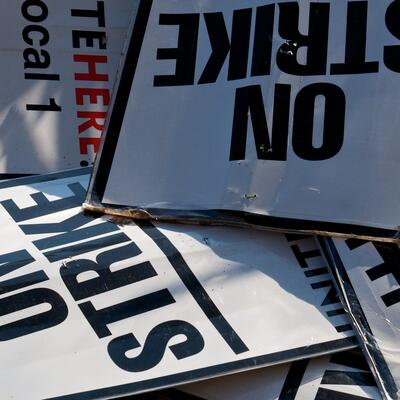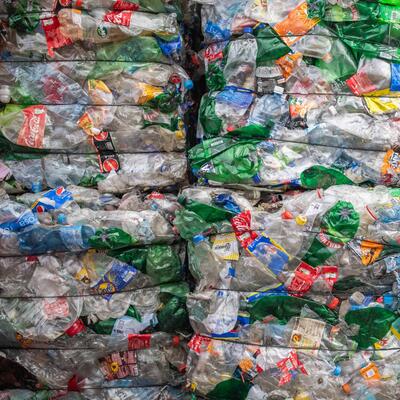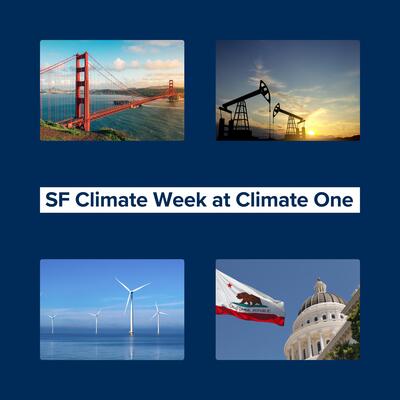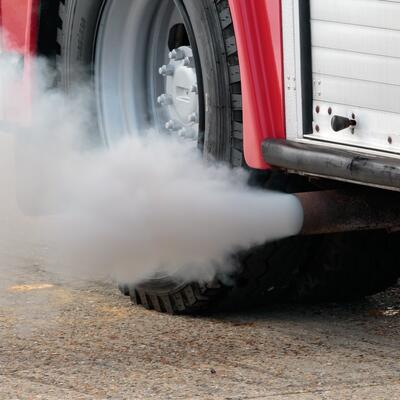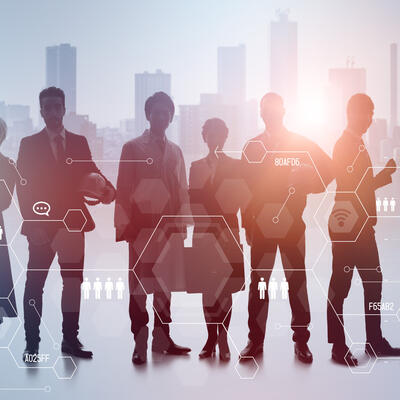
Entrepreneurs Creating an Inclusive Economy
Guests

Donnel Baird
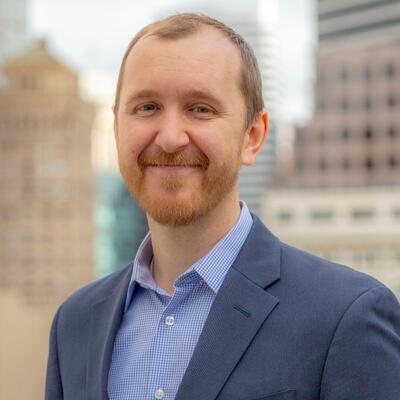
Andreas Karelas
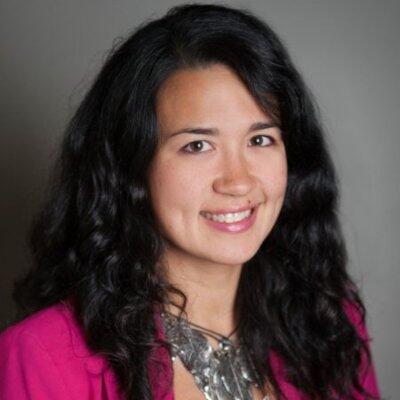
Sandra Kwak
Summary
As the spring of 2021 arrives, it would be hard to design a more challenging — or more promising — moment for implementing climate solutions.
Americans are reeling from an economic shutdown that’s pushed many out of the workforce, and widened the gap between the wealthy and the poor. Twelve years after President Obama entered the White House, many environmental activists and entrepreneurs see Biden-Harris as “take two” for efforts to separate economic growth from carbon emissions.
“Green jobs will materialize this time,” says Donnel Baird, the CEO of the climate technology startup Bloc Power. “I think what we didn't have last time that we have this time around we didn't have a cohort of incredible leaders.”
But an equitable transition away from fossil fuels isn’t just about solar panels and green jobs in low income neighborhoods. Many of those leaders are women, and people of color, and the emerging clean energy economy has to look different, all the way up to the top. Sandra Kwak, the CEO and founder of 10Power, says it’s not clear whether this new generation will get the financial backing they need.
“A lot of the same institutional biases that exist within our economic structures are also the lens that philanthropy is distributed through,” says Kwak, whose B-corporation helps people access and pay for energy in Haiti and other developing countries
“There are a lot of women founders of startup companies but...we do not get the funding that we need,” she adds.
Can the Biden administration’s push for climate solutions to be executed, in an equitable, inclusive way? Baird, who was an early organizer with Barack Obama’s Presidential campaign, says Joe Biden is coming into the Presidency under very different conditions.
“I'm delighted about what I'm seeing from the Biden-Harris team,” notes Baird. “Climate justice and racial equality are wedded together alongside employment, alongside public health and working our way out of these kinds of four simultaneous crises we’re dealing with...The devils in the details of implementation.”
Andres Karelas, the founder of RE-volv; an organization that helps nonprofits across the country go solar, says the people want action, now.
“Eighty-five percent of Americans agree that we would love to see one hundred percent clean energy in this country,” says Karelas. “We have the momentum in terms of people's awareness of the issue. Now the question is how do we mobilize them?”
Full Transcript
Greg Dalton: This is Climate One. I’m Greg Dalton. Twelve years after President Obama entered the White House, many environmental activists and entrepreneurs see Biden-Harris as “take two” for efforts to separate economic growth from carbon emissions.
CLIP-BAIRD
“Green jobs will materialize this time. I think what we didn't have last time that we have this time around we didn't have a cohort of incredible leaders.”
Greg Dalton: Many of those leaders are women, and people of color. But will they get the financial backing they need?
CLIP-KWAK
“a lot of the same institutional biases that exist within our economic structures are also the lens that philanthropy is distributed through.”
Greg Dalton: And clean energy still has a long way to go.
CLIP-KARELAS
“we have the momentum in terms of people's awareness of the issue. Now the question is how do we mobilize them, how do we motivate them to take action so that we can achieve real results.”
Greg Dalton: Building a clean and inclusive economy from the ground up. Up next on Climate One.--------
Greg Dalton: Can the Biden administration’s push for climate solutions to be executed, in an equitable, inclusive way? Climate One’s empowering conversations feature all aspects of the climate emergency: the individual and the systemic, the exciting and the scary, people who are in power and people who are disempowered. I’m Greg Dalton.
[music change]
Greg Dalton: Despite the Trump administration's efforts to divide Americans, we actually are united when it comes to wanting a greener way of life.
CLIP-KARELAS
“85% of Americans agree that we would love to see 100% clean energy in this country. 85% of Americans! How many issues do 85% of Americans agree on?”
Greg Dalton: Andres Karelas (ahn-DRAY-us kuh-RELL-us) is the founder and executive director of RE-volv; an organization that helps nonprofits across the country go solar. He recently authored the book Climate Courage: How Tackling Climate Change Can Build Community, Transform the Economy, and Bridge the Political Divide in America. In the book, Karelas breaks down how the right conversations about Climate Change, can leave people feeling empowered, rather than skeptical, or hopeless.
CLIP-KARELAS TRT: 18
“If you point someone to the reality of climate change and do not point to the solutions that they can be involved in that there's nothing that they can do, they are less likely to believe that it is real, than if you point out that, here is the reality of climate change, and here is what you can do about it.”
Greg Dalton: Karales’ personal awakening about the importance of Climate Change, took place on the day the twin towers fell.
Andreas Karelas: My first week of college was also 9/11 and that was, I was going to school in Washington DC. My family is from New York so that was devastating and it really got me thinking about the globe in the world global politics in a way that I hadn't really before. I was certainly one of the many activists out in the streets protesting against the war and really looking at this the war as an oil grab of you know the United States government. And I started taking economics classes around energy and the economics of oil and realizing that there were alternatives and that clean energy was a viable option. And at the time it was viable but the costs were obviously way more than they are today. So, that really kind of set me up with a passion in clean energy and solving the climate crisis. How can we use clean energy not only to solve the climate crisis but also to stop inequality to bring energy to parts of the world where they don't have it. And so that was really kind of the driving force that kind of got me started down the path.
Greg Dalton: How's your thinking about the problem and solutions evolved over time
Andreas Karelas: Yeah, when I graduated from college, I was very passionate about clean energy and I knew that I wanted to sort of focus on this in my career. And I was also very sort of engaged with the climate movements going to marches, signing petitions doing online activism which you know we would now call “clicktivism.” And what I found was that particularly when Pres. Obama was elected, he ran on a platform of I'm going to be the president who solves the climate crisis. And those of us who were in the movement were ecstatic, right? It was like this is it we’re finally gonna solve this thing. And, as you know, and I’m sure many of the listeners know that didn't happen, right. You know, 2009 we had Markey-Waxman. We thought this was gonna be this watershed moment. The bill dies in the Senate. Later, Obama goes to Copenhagen and doesn't really sort of solve the crisis at the scale that we wanted. And so, we basically are kind of back to square one where it's like wait a minute we as a climate movement we marched we protested we made our voices heard, and yet the political establishment was unable to deliver. Was basically sort of they had their hands tied. And so, that really sparked a question for me, which was okay if Washington was never to solve the problem. Like if their hands are tied such that they can never do anything about this. How might we go about solving the problem, right. Like how might we go about solving the problem without waiting for our elected officials to solve it, right. Assuming that they never come. And so, that was really I think the big shift for me and that really got me down this path of okay well, where do solutions lie if it’s not at the top. And I am very much a fan of people taking individual personal actions for the message that that sends to the world. I don't think that the solutions lie at the individual level, right. And so that really brought me to this point where okay I think the solutions lie at the community level. At the community level we can take action with each other. We can create sort of real impacts that we can see and that we can feel and that can sort of create movements.
Greg Dalton: So, you write about speaking to people of faith conservatives. So, if someone who wants to reach a person of faith to use a certain language or have a conversation heaven forbid these days with a conservative about climate. How should one do that speak to meet people where they are and listen and what language should they use.
Andreas Karelas: Yes. This is really the crux of the question right. This is the fundamental issue. And, you know, this is where I really turn to Katharine Hayhoe who wrote the forward of the book. And her message for years has been the most important thing we can do about climate change is just talk about it, right, that the vast majority of Americans report that they never talk about climate change. So, how can we expect the populist who sort of really rally behind this issue and our politicians to take action on it if we’re not even talking about it. So, that, you know, to me is okay that’s the issue that we need to be focusing on. And Katharine also has a tremendous amount of insight that she's shared around how you do that. And what she describes and what I write about in the book is connecting the dots between what people already care about and how that is tied to climate change. So, you mention faith, I have a chapter on faith communities in the book that are doing incredible work from Sally Bingham, in Interfaith Power and Light to Ambrose Caroll and Green The Church to Huda Alkaff with Wisconsin Green Muslims and the list goes on and on. And there are incredible ways that we've seen and that I highlight in the book from each faith where people are reaching into their own values of that faith. What is it that this faith holds to be imported or sacred or what is our responsibility to care for the earth or steward creation? And then tying that to how they can get involved in protecting the planet. And we’re seeing more even evangelical groups, you know, are taking action. You know, Katharine is one of the, you know, kind of leading advisers to many of these evangelical climate groups.
So, I think that there's a lot more momentum there’s a lot of examples of how we do that and really at the end of the day it boils down to how do you listen, as opposed to tell, right. Like we’re not walking into a community and saying let me show you, you know, all these horrible things that are happening around the climate and like you said you know, sort of should, you know, telling people what they should be doing instead it's, you know, how do you connect to your local environment. Let's say you are an outdoors person you are a fisherman you know how have the fish population been affected by the change in climate. Are you a farmer? How has your crops been affected by the change in climate? Do you recognize the change in climate? And they do they absolutely do, right, especially folks who have been have their hands in the land. They know that the climate is changing. So, that's where you start right is like what are points of mutual interest. Do you care about nature? Do you care about clean water clean air for your grandchildren, right? Like these are the kinds of things that people can say yes, I agree with you on this. Yes, I agree with you on this. Okay, how about clean energy. Well guess what, clean energy, 85% of Americans agree that we would love to see 100% clean energy in this country. 85% of Americans. How many issues, Greg, do 85% of Americans agree on, right? I can't think of any others. But clean energy is there. So, that’s really an important point of commonality that we have with everyone.
Greg Dalton: You write that a sense of progress is really important. Does that sense of progress have a meaningful impact other than making us feel better and more powerful? Because people often say like I want to change, but I want to make sure that my change matters.
Andreas Karelas: Yeah, yeah. Absolutely it does. I mean, look, if you’re trying to lose weight right and you start dieting and you start exercising and you know you're trying it for you know the first week the second week the third week. Not only have you not lost any weight maybe you put on a pound or two and you’re thinking what gives, you know, what am I doing here? You’re easily going to give up, right. You gonna sit back on the couch and pop open the chips, right. Like that's how our brain works. Whereas if you are our seeing progress if you're able to stick with it long enough to see progress or if you are told ahead of time. Look, sometimes you know if you're trying to lose weight it might not, you might not see some progress in the first few weeks. But if you wait a month or two months and you stick with it, you’re gonna see the progress. Once you get a little bit of progress, well then all of a sudden you feel in control you feel that this is part of your ability to make a change in the world. You feel empowered and you feel that you have a sense of agency. And this, in my opinion is absolutely critical, right. Like this is the difference that in fact many of the studies, you know, showed I talk about this in the book that scientists were sort of researching and surveying Americans and basically saying that if you point someone to the reality of climate change and do not point to the solutions that they can be involved in that there's nothing that they can do, they are less likely to believe that it is real, than if you point out that, here is the reality of climate change, and here is what you can do about it, right. Like, so it seems counterintuitive how the human brain works. But if we see that there's a problem and we know that there's a solution that we can use to solve the problem we’re more likely to believe that the problem exists. Whereas if there is no solution, our brain is literally sort of built to be able to say, well, I’m just gonna forget about that and pretend it’s not a problem.
Greg Dalton: Andreas Karelas is author of the new book, Climate Courage: How Tackling Climate Change Can Build Community Transform the Economy, and Bridge the Political Divide in America. It’s an excellent synthesis of a lot of different thinking on different dimensions of climate change. You write about the mere exposure effect and how is that relevant to the spread of solar and other modes of clean energy?
Andreas Karelas: Ah yeah. This is actually I think our secret weapon in the fight against climate change. Because what the studies show is that solar in energy in particular has this contagious effect or this viral effect this network effect where when one person goes solar their neighbor and their neighbor are more likely to go solar. And the same is true if you look back at the Prius or the Tesla, and really just making it more commonplace, right. That when somebody sees it okay, you know, my neighbor did this they’re saving money I want to do this too. This is part of who I am. This is part of my community. And actually, the most recent study that came out of Tufts and UC Berkeley about disparities of solar according to race, found that this effect this sort of seeding effect or this feedback loop of solar actually has more impacting in committees of color and its almost twice as powerful in African-American communities.
So, it’s one of the things we talk about and the solar industry in particular needs to address needs to be spend more time and the climate movement in general. How is it that we make, you know, this is obviously something that Van Jones, you know was the spokesperson for. How is it that we make sure that the green wave lifts all boats? How do we make sure that these technologies are not isolated to privileged communities, but that everybody has access to the technology and the benefits that the clean energy in solving climate change can have? And so, yeah, there's a lot that we can do there to improve that situation.
Greg Dalton: And the math is getting even more favorable for people who put rooftop on their solar for their home or their company because with the wildfires and, Californians are still paying for an electric deregulation debacle nearly 20 years ago. People in Texas are going to be paying for their market-based power for a very long time. If you have your own energy in your rooftop you’re insulated from those rising cost. Tell us quickly your company revolving community solar fund, quickly, just tell us what that does.
Andreas Karelas: Absolutely. So, I started a nonprofit called RE-volv 10 years ago. Actually, we just celebrated our 10th anniversary. And what RE-volv does is it’s identified a problem which is that nonprofit organizations at the community level in particular, face a very steep barrier to going solar. They really can't get their solar projects financed the same way you could if you are a homeowner or a business owner. There are particular barriers that prohibit them from going solar. And so RE-volv started out as a crowdfunding platform where we were raising money through crowdfunding donations that went into paying for each solar project for community based nonprofits across the country, which then would pay us back over time and cede a revolving fund that we call the Solar Seed Fund, helping the next nonprofit, and the next nonprofit go solar. All the while holding education and community engagement events so that we can really take advantage of that ripple effect of solar. So that each nonprofit that goes solar can then plant a seed in the community and get those community members to go solar and to take political action around clean energy and climate change. And, yeah, I’m proud to say that at this point we've deployed over $10 million of solar for 43 nonprofits in 10 states we’re saving them $17 million on their electric bills that they are using to put back into their mission of serving the homeless the hungry providing afterschool programs and the like. So, yeah, I’m very excited about that.
It’s a very exciting time for us and we continue to grow, particularly through our solar ambassador program as I mentioned, which is college students who as well as working professionals, people of all ages but mostly college students who sign up as volunteers to our solar ambassador program. And we basically train them on how to go into their community and spearhead these nonprofit solar energy projects. And many of which I'm proud to say have gone on to work in the clean energy industry after they graduate.
Greg Dalton: Andreas Karelas, thanks for coming on Climate One.
Andreas Karelas: Thank you so much for having me it’s a huge honor.
---
Greg Dalton: You’re listening to Climate One, and we’re talking about how to make the shift to a Green economy inclusive and open to all. Coming up, How a precocious pre-teen became CEO of a leading environmental corporation.
CLIP-Kwak
“my little fourth grader image of a scientist was an old white man. And so, I borrowed one of my dad’s white shirts and I made this beard out of cotton balls and I gave a presentation to my entire school about climate change.”
Greg Dalton: That’s up next, when Climate One continues.
---
Greg Dalton: This is Climate One. I’m Greg Dalton. An equitable transition away from fossil fuels isn’t just about solar panels and green jobs in low income neighborhoods. The emerging clean energy economy has to look different, all the way up to the top.
CLIP Sandra Kwak
“There are a lot of women founders of startup companies but...we do not get the funding that we need.”
Greg Dalton: Sandra Kwak (KWAHK) is one woman who beat the odds. She’s the CEO and founder of 10Power, which helps people access and pay for energy in Haiti and other developing countries.
CLIP Donnel Baird
“We need to create some climate bonds, that are gonna allow us to finance this clean energy infrastructure in the communities that we care about. Vulnerable historically disenfranchised communities need to own the climate infrastructure that gets installed in their communities. Not only do they get the jobs not only do they get the financial returns, but they need to have ownership stakes in this infrastructure as it rolls out.
Greg Dalton: Donnel Baird (duh-NELL BARED) is the CEO of BlocPower, a climate technology startup based in Brooklyn. They help buildings with high energy usage in financially underserved communities become more efficient. That’s something he learned about the hard way growing up.
Donnel Baird: We did not have a functioning energy system for heating and cooling in my home. We lived in a townhouse in Brooklyn with a bunch of other families we like shared a bathroom with a bunch of other families on our floor. And so, we didn't have a functioning heating system. So, we used our oven in the kitchen we would turn it on and it would heat our apartment. And we would open up the windows in the living room to release carbon monoxide. So, I would say it’s pretty poor, but early on, we learned about relationship between energy or the lack thereof, and public health. That if you don't get energy right it's hard to get health right. And so, that was a good lesson to learn early on.
Greg Dalton: Well, yeah, it makes me think of a lot of learning these days about how bad natural gas stoves are at indoor air quality. A lot of education about that these days. Then you attended an elite prep school and after college became a volunteer for the Obama campaign rising up the ranks to become a field director in 8 states. Then you went to business school and founded the company BlocPower. Say more about your journey from community organizer to political organizer to founder of an energy startup. What was the through line driving motivation for you?
Donnel Baird: I wanted to create jobs for low-income communities of color. When I was a kid I was probably like six or seven walking down the street to pick up my two-year-old sister with an older cousin. We saw two young men standing on the other side of the corner and one of them pulled out a gun and shot the other in the face. And that was obviously traumatic for a kid to see, for any kid to see. It was also like pretty terrible for both of the young men who were involved in that shooting. Obviously, one of them got shot in the face. But the other one, you know, shot someone I mean which is also traumatic and terrible. And so, as I got older, you know, there are different layers of meaning to that incident. Eventually, I had a fear of confrontation for a while. I didn't want to get into fistfights because I didn’t want somebody to pull out a gun on me. But as I got older, it became clear everybody needed jobs; the shooter the victim, both people needed to be employed outside the drug trade so that they wouldn't be involved in these violent escalations because there was a drug dispute, right. And so, what were the things that we could do to create jobs. And when I went to college, I became a climate activist. My best friend in college is now a professor of public health at MIT, Mariana Arcaya. Shetook me to school on climate change she just like beat it into me and she made me take classes. And so, I learned about the climate crisis and so you know, for me it was how do you fuse those two things, how do you create jobs and economic opportunity. And then how do you create jobs that are good for the environment that are in sustainability. And so, whether it is as a community organizer or as a senior staff from the Obama campaign or a consultant to the Obama administration and then ultimately at BlocPower. I've been really focused on that intersection of like how you create jobs and wealth for historically disenfranchised communities. And how do you do so in a way that reduces greenhouse gas emissions. And that’s one of the reasons I’m such a fan of Sandra is because I think her work is, you know, she’s working on the same thing. In a different context, but same intersection.
Greg Dalton: Fascinating story of a traumatic personal experience and fusing that into with education into a career. Sandra Kwak, in fourth grade you read a book 50 Ways To Help The Earth when you were attending a Montessori school. How did that book resonate with you and then what did you do next?
Sandra Kwak: I could not believe that there was this thing called climate change at that time called global warming that people knew was happening and no one was doing anything about it. So, I felt like chicken little running around my school saying, hey, everybody, look there are these greenhouse gas emissions that are buildings and cars are spewing it to the atmosphere that are creating this heat envelope around the planet. Why are we not acting? And at that time, my little fourth grader image of a scientist was an old white man. And so, I borrowed one of my dad’s white shirts and I made this beard out of cotton balls and I gave a presentation to my entire school about climate change. And it was really this formative moment for me and it just struck me as crazy that people that this was in books and that people were not acting on it. And I’m lucky that I found my life calling at an early age. And that I had teachers who are putting resources like 50 Ways To Help The Earth in classrooms.
Greg Dalton: And then later in your mid-20s you founded a tech company and ran another one. That's quite a remarkable track record. So, connect us there that climate aha moment that awakening in fourth grade with founding a couple in running companies in your 20s.
Sandra Kwak: Well, in undergrad I was focused mostly on arts and political activism. So, using visual arts as a medium for communications I was doing a lot of photography and running an underground arts organization doing a lot of street murals. And feeling like the impacts that I was having was more on a one-to-one basis, and wanting to scale up my personal impact to have a larger societal reach. And so, I sought out one of the few at the time green MBAs in the country. I was living in Atlanta, Georgia I sold all my things, rented a van, drove across the country took them out to San Francisco to get my green MBA. And while I was at Presidio started looking at where the bulk of carbon dioxide emissions were coming from which about one third of CO2 emissions in this country come from the built environment, automobiles are about a quarter. And when you look within the built environment where are there cost-effective means of reducing emissions, energy efficiency seemed like an obvious choice. And so, several of my colleagues at Presidio launched an energy efficiency company for commercial buildings. While in grad school we advance in a couple of business competitions we participate in the Cleantech open and worked on that for a few years. And then from there, I went into big data for the smart grid. So, I started working for a Silicon Valley company called AutoGrid that is using information from smart meters and synthesizing it with big data algorithms to run energy efficiency and demand responses whilst distributed resource and virtual powerplant programs for utilities.
So, we are basically building apps that utilities would give for free to their customers. And using big data to guarantee demand response for utilities. So, as opposed to being this regulatory thing that the PUC was saying the utility has to do and the utility was only using their largest factories in commercial and industrial customers. We were enabling every day consumers of electricity to participate in cost-saving programs. So, we were actually running the largest demand response program for residential customers in the United States at Oklahoma gas and electric. So, grandmas were getting on TVs saying, “I saved $500 this summer and bought a ticket to go see my grandbabies.”
Greg Dalton: (Laughs)
And while all of that was really exciting being able to use technology to save megawatts of power at a time on the grid, I was still feeling that a lot of my social justice and activist leanings were not completely fulfilled. I had this desire to use all of this amazing cutting-edge technology that we have in renewable energy and energy efficiency to actually tangibly improve people's lives on the front lines. And I was thinking back to a project that we did in school where we designed a micro-finance model for organic farmers collectives in Nicaragua to get access to solar powered drip irrigation systems. So, the initial cap ex was funded by grants and the ongoing repayment of a zero-interest loan fed a pool of capital that enables people from the community to get solar on their homes. And that really had struck me in my life as one of the most meaningful projects I've ever worked on and that was the genesis of 10Power.
Greg Dalton: A Forbes column in 2019 noted that many investors have pledged to fund more women founders, but that has been a notable failure despite the awakening of the Me Too movement. Why aren’t there more women founders of startup companies?
Sandra Kwak: There are a lot of women founders of startup companies but the --
Greg Dalton: Do they get the funding they need?
Sandra Kwak: We do not get the funding that we need. And you know what within venture capital it’s pretty miserable hovering between 1% and 2%. And when you look at women of color-led companies, it’s even more tragic it’s around .2% of total funding goes towards women of color-led companies. On the flipside, women of color-led companies are some of the fastest-growing job creators in our economy. And so, I think it's really a big missed opportunity for the economy right now, especially as we’re trying to bounce back from the pandemic. We really need to see more investment in people of color, led by BIPOC led companies’ women-led companies. And the more equity that you're investing in society the more justice and equity that you're going to see being grown by BIPOC and women-led business leaders within their communities.
Greg Dalton: Donnel Baird, how many investors turned you down and what was your experience as a black founder in the sort of tech pro world?
Donnel Baird: Yeah, let me circle back to that. I wanna add quickly to Sandra’s point. The New York Federal Reserve Bank did a study of which businesses created local jobs and maximized economic recovery after the 2009 financial collapse. And it was local woman-led e-commerce businesses. Non-venture backable local digital small businesses that sell cakes or toys or whatever it is. These were the businesses that correlated with economic recovery across America in any county in the country where you had a group of these businesses, that county was able to recover. In counties where you do not have digital businesses led by women, led by women of color, the recovery the economic recovery in that county was slow. So, I just think that what Sandra is saying is like incredibly important and just want to highlight it. It’s not that we’re asking people to invest in women founders because it's fair and because it's moral and ethical even though it is. It is like the best thing for our economy. And it’s the best thing for our economic recovery. And so, if you respond to that kind of argument like then take that and go do it. At BlocPower we spoke to over 200 investors venture capital investors, but really impact investors. Sandra, I don't remember what your journey was like but mine was horrible it’s terrible. I don't pull any punches about it. I try not to like mention the investors name when I throw them under the bus but we had terrible experiences just atrocious behavior. We signed agreements with impact investors they changed the agreement at the last moment. They made secret changes to screw us and didn’t warn us or tell us. when we asked questions, they threatened to withdraw the entire deal. Just atrocious behavior from impact investors--
Greg Dalton: And let me just jump in here and say, the impact investors are investors who are intentionally not seeking maximum dollars, they’re seeking profit and social change. So, you're saying that the social change, you know, “more enlightened the capitalist investors were the ones who are treating you that way.”
Donnel Baird: Oh, they’re barbarians I mean they’re cave people. I mean they’re Neanderthals.
Greg Dalton: And going around saying we’re social do-gooder. They’re the do-gooder capitalist.
Donnel Baird: Yeah, it’s like marketing. I’m sure they feel very good about themselves because they’re doing “well” but they’re not, right, they’re not investing in companies actually not in a significant way. We were treated much, much better by traditional private-sector venture capitalists in Silicon Valley that we were by impact investors. And the financial returns that the impact investors we’re looking for were in many cases they were higher than what the pure for-profit investors. So, I remember talking to a prominent impact investor about a debt note and I was like, well, what interest rate are you gonna charge me for this debt? And he was like, I’m gonna charge you 17%. 17% on debt? Is this like credit card? Is this usury? Like what are we doing here? I know you wanna save the planet and make a social impact but charging people, 17% is not the way to do it.
But, you know, I do think there are lessons to be learned for traditional venture capitalists who, as we talk about struggle to invest in women struggle to invest in people of color, less than 3% overall. I think there's lessons to be learned for climate philanthropists who are even worse than the traditional investors. A lower percentage of climate philanthropy goes to people of color then venture investment goes to people of color. So, the climate philanthropists who are giving away money they’re not even pretending to invest it, they’re giving it away in grants they can’t find a way to give more capital to people of color than Silicon Valley invest in people of color.
Greg Dalton: Well, climate philanthropy is dominated by Steyer, Bloomberg, there’s a bunch of billionaire white men that really drive climate philanthropy in terms of the number of dollars moved.
Donnel Baird: So, the ultra-high net worth people that you named, they actually do pretty decent on some of the race stuff. So, I think if you look at Steyer’s portfolio if you look at Bloomberg’s portfolio, they do great. I think when you look at family offices or family foundations or local community foundations. That's where you see people really struggling to move capital to underserve minorities and women. And the problem is again, it’s not it’s just unethical it’s like we’re not gonna win. I mean, we’re not gonna have the political coalition that we need to be successful.
Greg Dalton: Sandra Kwak.
Sandra Kwak: Edgar Villanueva in Decolonize Wealth hit the nail on the head in terms of philanthropy and equity.
Greg Dalton: And what was the basic thesis there?
Sandra Kwak: That a lot of the same institutional biases that exist within our economic structures are also the lens that philanthropy is distributed through. And especially within family offices you have small teams distributing large amounts of capital and so it tends to go to the same old players. And so, we’re actually seeing a lot of perpetuation of racism especially when you have you know the white savior complex working in communities of color and philanthropy can be very detrimental to continuing this perpetuation of the same types of colonization and institutionalized racism. So, in order to flip this what we really need to do is provide those concessionary dollars to people from the communities that they're working in and to really empower business leaders and nonprofit leaders who are closest to the issues that they're dealing with. And take off those biased glasses when allocating capital.
---
Greg Dalton: You're listening to a conversation about what next steps in the transition away from fossil fuels might look like, and who will be included. This is Climate One. Coming up, how President Joe Biden can deliver on some unfulfilled promises made by Barack Obama.
CLIP-BAIRD
“I'm delighted about what I'm seeing from the Biden-Harris team. Climate justice and racial equality are wedded together alongside employment, alongside public health and working our way out of these kinds of four simultaneous crises we’re dealing with...The devils in the details of implementation.”
Greg Dalton: That’s up next, when Climate One continues.
---
Greg Dalton: This is Climate One. I’m Greg Dalton. We’re talking about an inclusive energy transition with Sandra Kwak, CEO and founder of 10Power, and Donnel Baird, the CEO of BlocPower.
Baird was an early organizer with Barack Obama’s Presidential campaign, back in 2007. He says Joe Biden is coming into the Presidency under very different conditions.
Donnel Baird: Obama was constrained in ways that Biden was not is not.
Greg Dalton: How so? Because a white guy has more latitude, Obama had to be really careful because he was the first black president?
Donnel Baird: In part, I mean, I was a senior staffer for Obama. I left Brooklyn and pack up my car and drove down to rural South Carolina to join the campaign. I had thought that it would be good for all the you know kids in the neighborhood where I was a community organizer to see a first black vice-presidential nominee. And I thought that if we could win the South Carolina primary then Obama could be like Hillary's vice president and that would be like good for black people to look up to good for black children to look up to him and see that. And so --
Greg Dalton: So, you thought of Obama as the number two on the ticket?
Donnel Baird: Yeah, yeah, which goes to show you even in someone who is focused on black empowerment. Even I, at the beginning of the campaign didn't think it was possible for him to win. And so, now we kind of take it for granted but that was just a monumental achievement on his part. It wasn’t the campaign it was on the part of him as a candidate who, you know, like Sandra, you know, some of the multiracial background who also was able to speak to people in all different corners, all different ethnicities and nationalities and kind of build a common framework in language and movement and then turn that into a fist that we can impose on people, you know, these disparate fingers and unite them into fist that we could impose on the Democratic Party and then the Republican Party to win the presidency. I remember when we selected Joe Biden. It was a strength that Joe Biden has a history of opposing people of color in public schools. It is a strength that he comes out of white working-class backgrounds that early in the primaries he said that Obama was like articulate and clean and bright, which Al Sharpton, who had also run for president was rightfully really offended. He was like, Joe, what are you saying? You’re saying that I’m dirty, I’m not bright, I’m not articulate?
And so, Al Sharpton was rightfully offended by some of the comments that Biden made in the primary where he was running against Obama. So, it was a strength that Joe Biden identified and was identifiable with certain parts of the country that are I’m gonna say on a learning journey about racial equality, right, and racial justice. And so, that does allow him more latitude to communicate with different parts of the country. He’s credible with them in a way that it's really difficult for Obama to do. And then some of it, and I’ll get in trouble for this, some of it has to do with the political nature of Obama. Obama is a conservative institutionalist which he himself will tell you. And so, some of the more radical if you will elements of what needed to happen in terms of racial justice, certainly in terms of climate justice, certainly in terms of climate mitigation. I believe no one loves Barack Obama more than me but I wish that we could have gone back and been much more aggressive in many, many areas much, much earlier on. And I do think when we’re looking back, you know, 20, 50 years from now, there's gonna be a question around could we have gotten more done earlier on in the first and second Obama terms than we did. And would that have been the correct move for the entire human race, relative to some of the policy priorities that we had at the time. That said, I'm delighted about what I'm seeing from the Biden-Harris team. Climate justice and racial equality are wedded together alongside employment alongside public health and working our way out of these kinds of four simultaneous crises we’re dealing with. And so, I'm really excited what I'm seeing about the Biden-Harris in terms of their public policy positions. The devils in the details of implementation, can we get this through the Senate? And if we can get it through the Senate, how do we implement it on the ground? How do we create jobs, lower the cost of equipment so that clean energy is not only more accessible in America but also in Haiti, right, where 10Power is focused, and around the world.
Sandra Kwak: For sure. I think Kamala Harris is also a huge inspiration, you know, the way that Obama, the way that kids can imagine themselves, you know, in the White House from all different races and backgrounds. I think for both diversity as well as gender. Kamala Harris is a huge inspiration and I'm so thrilled to see the diversity of folks in the cabinet where for the first time seeing a lot of Native American leaders, indigenous women, specifically new positions, Gina McCarthy in charge of climate. And so, it’s really heartening to see that policy is aligning with a lot of the impact initiatives that you know we in the trenches of social enterprises have been working on for a long time. 10Power is looking right now at potentially extending to work with tribes stateside. So, I’m really excited to see a lot of the potential subsidies coming through the DOE to level the playing field. It is insane when you look at energy and equity within our own communities. You know, Donnel, you have first-hand experience with this when you go to a lot of reservations, they’re still not running water, a lot of places in the rural south don't have adequate sanitation, let alone reliable electricity. And so really turning an eye domestically to how we can create more energy access and energy equity. It's really important that we provide the appropriate financing mechanisms because the grid that you know a lot of us in cities enjoy was heavily subsidized, very low-cost long-term bonds. And that type of capital doesn't necessarily exist right now for marginalized communities. So, it’s important that we create blended capital stacks and that there is also government capital that's available to really bring us all up to the same level.
Donnel Baird: I serve on the board of Sierra Club foundation we recently made an investment to create one of the largest wind turbine plants that will be owned and operated and maintained by native communities in the American Midwest. Those are the kinds of things that we really need impact investors as well as the government as well as climate philanthropists to collaborate to create, you know, if there aren’t long-term bonds like they’re used to be. Well then, we need to create some climate bonds, right, that are gonna allow us to finance this clean energy infrastructure in the communities that we care about vulnerable historically disenfranchised communities. And these communities need to own the climate infrastructure that gets installed in their communities. Not only do they get the jobs not only do they get the financial returns, but they need to have ownership stakes in this infrastructure as it rolls out.
Greg Dalton: It’s a real irony that the Navajo Nation had a huge coal-fired power plant on their land and that yet there is energy poverty all-around that huge generating station that sent power to Los Angeles. But people on the shadow of that coal-fired power plant didn't have power. Donnel Baird, you worked on green jobs as an organizer for a confederation of labor unions representing 5 million people across the country. Yet, green jobs never realize their promise and now Pres. Biden is putting jobs at the center of his climate efforts. Will green jobs materialize this time?
Donnel Baird: Green jobs will materialize this time. I think what we didn't have last time that we have this time around we didn't have a cohort of incredible leaders like Sandra. We only had idiots like me who were cutting our teeth for the first time and just I mean I didn't have an MBA from an all sustainability program that can prepare like we just, we did it. So, it does matter that we have a new cohort of leaders who over the last 10 years have emerged. It does matter that there have been innovations in software, the cost of machine learning has plummeted. The cost of cloud computing has plummeted. I got my first iPhone in 2007. Now everybody has an iPhone. And so, we can have native populations going building to building and taking photos and videos and filling out survey about how much lead and asbestos and air pollution is going on in their buildings and in their homes. They can measure that with their smart phone they can report that to us and we can train people on how to upgrade and fix their own buildings and own community through apps through people’s smart phones, which everybody has. So, the collapse and the cost of a lot of the computational capacity that's available now that was not available to the Obama team 10 years ago is necessary as a prerequisite to unlock the possibilities of green jobs. I would just add to that quickly to put a finer point on it. I work for coalition of labor unions. We had 90 billion with a B $90 billion that we wanted to use to invest in green jobs and energy efficiency across the country. Native populations, in the urban populations in rural populations we were gonna co-invest with Citibank and Barclays to structure green bonds. And we were gonna train and hire workers across the country to go building to building and green all the buildings. We were not able to achieve that during the Obama administration. We’re able to achieve a lot we got Tesla and SolarCity and a lot of other stuff going. We were not able to achieve building to building green buildings projects with a million good paying jobs. And I do think that we’re gonna be able to achieve that under the Biden-Harris team because there's been a lot of lessons that we've learned over the last 10 years and the cost of software and data will allow us to access and analyze these projects in a way that we couldn't 10 years ago. And again, a cohort of, you know, a new generation of leaders that understands finance that know how to be creative are gonna allow us to deploy capital into these communities to create these jobs. So, that is my expectation we fully intend to deliver on this promise.
Greg Dalton: Sandra Kwak, 10Power is a B Corporation. What is that mean for people who are not familiar with that term and how is a B Corp different than a regular corporation? I know Patagonia is a B Corp.
Sandra Kwak: Yeah, you’re fully committed in your bylaws to upholding human welfare and environmental best practices equal to your fiduciary responsibilities. So, fully embracing the triple bottom line of people and planet equivalent to profit. So, in the case of most traditional companies to do responsibility is the one and only bottom line, whereas with a B Corp. you have equal responsibility to your stakeholders to your employees to the constituents that you serve and to the environment and the resources that you are using and that you maybe impacting with externalities. And we actually we’re named the best in the world environmental B Corp in 2019 which was a surprise as a small company. But it's based on all of the B Corps in that year so that was --
Greg Dalton: Congratulations.
Donnel Baird: Congratulations. That’s amazing.
Greg Dalton: Yeah, and it’s a big deal because regular companies that don't maximize their profits can be sued for not doing that and B Corps, you know, that's a different legal situation. Donnel Baird, you are active, looking at Philadelphia, Milwaukee, Chicago, cities that have regulations supporting moving away from fossil fuels. How do you plan to green the buildings in those cities?
Donnel Baird: Well, we’re already doing it we’re greening them. We have projects in Philly, Chicago, Milwaukee, we’re helping a pastor in Milwaukee today, reduce his fossil fuel consumption. And part of what we've done is we've built digital models of buildings all over the country. We run physics-based, you know, thermodynamic models of energy waste and fossil fuel waste in the buildings. And then we can recommend the kind of green energy equipment upgrades that make sense for each and every building. And so, we can do that for a couple million buildings across New York State and hopefully soon, knock on wood, you know, hundred million buildings across America. And so, by providing the energy efficiency or electrification or solar recommendations of the size and type of equipment that are appropriate to each and every building would make it easy for the building owner to decide to kind of move forward with the project because they know what a green project would look like they know what the return on investment would be, what a projected cost would look like. And then we provide a full stack like turnkey service to the building owner so that they don't have to navigate 6, 7, 8, 9 different engineer or architect, you know, lenders, construction firms who all disagree with one another. We streamline it and make it easy for people. And then last, we finance the project. So, we recently closed a 55 $56 million facility led by Goldman Sachs and other investors who our focus on providing capital to clean energy infrastructure in urban buildings. And so, we know that many buildings across the country, look we got 30 million unemployed Americans, right, like they need capital in order to convert to solar. They want to convert to solar they want to save money. They've learned about what it means to be green over the last 10 years to have a green and healthy building, but they still need capital, right. And they need to be able to borrow it or lease it or what have you. And so, we have a credit line that allows us to finance these projects for folks.
Greg Dalton: As we get to the end here. I just want to ask one question to bring it home. Donnel Baird, heat pumps are one way that homeowners can move toward cleaner power. We’re hearing a lot about heat pumps these days. So, briefly explain for us what a heat pump is and what kind of homeowner out there listening to this could consider replacing fossil fuel heat pump with something that might be electricity is getting cleaner fossil fuels are not. So, what is a heat pump and what kind of homeowner should consider moving their heating to one?
Donnel Baird: So, we think heat pumps allow you to turn a building into a Tesla. And what do we mean by that? Tesla is taking the fossil fuel equipment out of the automobile and replacing it with all electric equipment. All electric engine. Buildings use oil they use gas other fossil fuels to provide heating, cooling and hot water on a daily basis in buildings all over the country. A heat pump allows you to take that fossil fuel equipment out of the building and replace it with smart, healthy, green 100% electric equipment for heating for cooling for hot water. You’re turning that building into a Tesla you’re making it awesome. And we finance and install those for people and effectively you’re decarbonizing the building. You can reduce that greenhouse gas emissions that carbon footprint in that building by 70% when you put in a heat pump. Heat pumps have a terrible name they shouldn’t have been called like clean heat or green heat or, you know, no one knows what a heat pump is and it’s not sexy. But we’re trying to make people understand that if you care about climate change and climate mitigation and job creation a heat pump is one of the sexiest things out there. Because this is the way this is the silver bullet to help us address the four crises that our country faces. We got a jobs crisis we got a racial justice crisis. We got a pandemic, right, right. We have multiple and of course the climate crisis. And so, by installing heat pumps at scale in a 100 million American buildings the heat pumps actually have UV light inside them and so when they suck in air, they can actually clean the air of COVID-19. So, you’re creating jobs, you're reducing the spread of COVID-19 and other viruses. You can build up wealth in communities that have been disenfranchised when you can allow them to co-own and install these systems. And of course, you’re reducing greenhouse gas emissions by 70% and buildings are 30% of United States greenhouse gas footprint. So, we think this is a magic bullet and we’re excited to try and get to work on this.
---
Greg Dalton: You’ve been listening to Climate One. We’ve been talking about how to make an inclusive transition away from fossil fuels with Sandra Kwak, CEO and founder of 10Power,
Donnel Baird the CEO of BlocPower. And earlier in the show, Andres Karelas, the author of Climate Courage: How Tackling Climate Change Can Build Community Transform the Economy, and Bridge the Political Divide in America.
Greg Dalton: To hear more Climate One conversations, subscribe to our podcast on Apple, Spotify or wherever you get your pods. Please help us get people talking more about climate by giving us a rating or review. It really does help advance the climate conversation.
Greg Dalton: Sara-Katherine Coxon is our Senior Producer and our producer is Tyler Reed. Kelli Pennington directs audience engagement. Steve Fox is director of advancement. Our audio team is Mark Kirchner, Arnav Gupta, and Andrew Stelzer. Dr. Gloria Duffy is CEO of The Commonwealth Club of California, where our program originates. [pause] I’m Greg Dalton.



